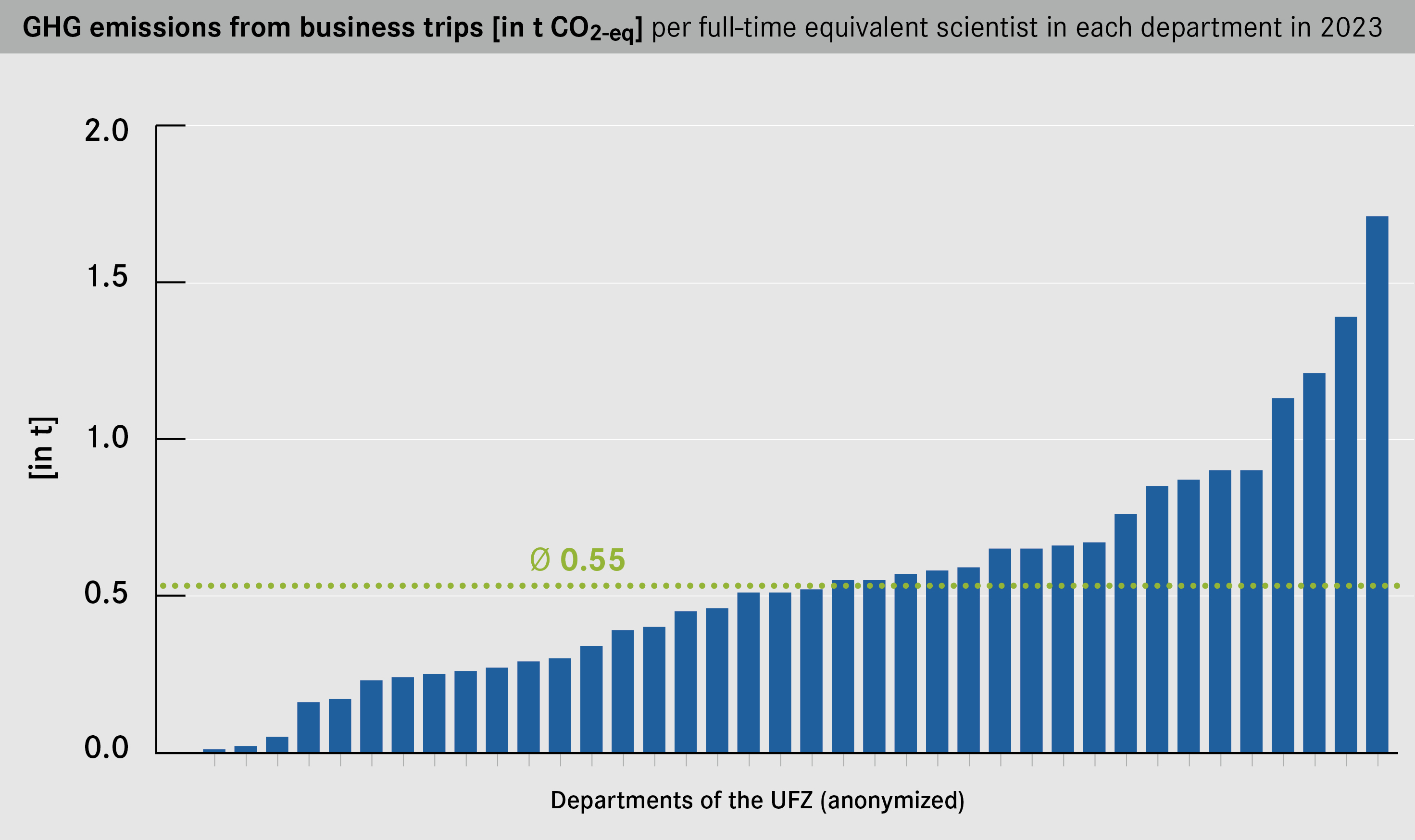
Path towards climate neutral operation
Since 2010, our center voluntarily offsets CO2-equivalents emissions caused by air travel. Furthermore, through greenhouse gas (GHG) offsetting, the UFZ achieved the goal of net climate neutrality in 2021. The long-term but still ambitious goal is to achieve gross climate neutrality (without offsetting) by 2040.
Detailed information on all measures taken and planned and developments in this area can be found in the annual, externally validated reports on environmental sustainability (environmental statements), including in the “Climate" chapter.
Examples for climate measures
- On energy efficiency & renewable energies
- On business trip mobility (example project Transparent CO2-eq footprint from business trips)
- To conserve resources
- For compensation
To save energy, we are gradually introducing more energy-efficient technology and are increasingly generating electricity ourselves with the help of photovoltaic systems at all sites. Already in 2013, we switched to green electricity for all its sites. A more challenging task is to reduce the amount of CO2-eq connected to the heat supply for the main Leipzig site due to contractual obligations and a necessary fundamental renewal of technical installations.
Detailed information on all measures taken and planned and developments in this area can be found in the annual, externally validated environmental sustainability reports (environmental statements), including in the "Energy" chapter.Reduced emissions are realized through changing business travel behavior. To this end, several targeted measures have been introduced such as an annual information of managers in all organizational units about their carbon footprint from business trips since 2020. This is used, among other things, as a basis for identifying best practice examples and further potential for improvement in discussions within the organizational units and in the internal EMAS audits.

Furthermore, there is a clear expectation that short distances of less than 1,000 km should be travelled by train or car instead of using the plane, if they can be reached in less than 8 hours.
Detailed information on all measures taken and planned and developments in this area can be found in the annual, externally validated environmental sustainability reports (environmental statements), including in the "Mobility" chapter.
To conserve resources, the UFZ relies on the digitalization of processes, such as electronic signatures and digital personnel files and procurement processes. Moreover, we donate used IT hardware to a non-profit integration organization since 2012 and manages research infrastructures throughout their entire life cycle, considering sustainability criteria and aspects from project start to resource-saving dismantling (to the concept of Life-cycle management of research infrastructures at the UFZ).
Detailed information on all measures taken and planned and developments in this area can be found in the annual, externally validated environmental sustainability reports (environmental statements), including in the "Resources" chapter.
Since 2010, the UFZ voluntarily offsets CO2-equivalents emissions caused by air travel. Furthermore, through greenhouse gas (GHG) offsetting, the UFZ achieved the goal of net climate neutrality in 2021. The long-term but still ambitious goal is to achieve gross climate neutrality (without offsetting) by 2040.
The UFZ uses compensation projects with the highest quality standards to neutralize greenhouse gas emissions: These are the so-called Gold Standard projects and, in the case of forest projects, the REDD standard (a high-quality Forest Carbon Standard such as VCS, ACR, Gold Standard, Plan Vivo). These projects not only contribute to CO2-eq avoidance, but also promote sustainable development in the project environment through ecological, social and economic aspects.
The CO2-eq-Compensation Working Group of the UFZ Environmental Committee, consisting of administrative staff and UFZ researchers, also carries out a comprehensive evaluation of the projects based on sustainability criteria. This means that the REDD forest projects receive a higher quality rating, which is combined with a high-quality additional standard to demonstrate the contribution of reforestation and forest conservation projects (e.g. REDD+) to the protection of biodiversity and sustainable development (preferably CCBS, Social Carbon Standard or a comparable standard). According to scientific studies, REDD+ projects are predominantly successful in reducing deforestation (Guizar-Coutiño et al. 2022). However, the potential emission reductions in most projects are overestimated (West et al. 2023), so an explanation of how this risk is dealt with in the tendering process is requested. In Gold Standard offset projects, for example, the level of human development and the degree to which the country is affected by extreme weather events is assessed using indices, so that offset projects in countries with a high degree of impact from extreme weather events, for example, receive a higher quality rating.
The offsetting projects are usually tendered and financed in 4 to 8 "lots" in the following categories in a public procurement procedure: Forest, wind power/hydropower/water treatment, biogas/biomass, solar and energy efficiency. In 2024, for example, the following projects were awarded contracts as part of the public tendering process: A project to protect Tanzanian forests for indigenous peoples, wildlife, and the climate in Tanzania, the project “Clean drinking water in Uganda through UV radiation", small biogas plants in Nepal, efficient cooking stoves in Uganda, and efficient cooking stoves for sustainable development in Rwanda.
Information on the offsetting projects financed can be found in the annual, externally validated environmental sustainability reports (environmental statements), including in the "Climate" chapter.
The long-term, but still ambitious goal is to achieve gross climate neutrality (without offsetting) by 2040.
Sources:
Guizar-Coutiño et al. (2022) A global evaluation of the effectiveness of voluntary REDD+ projects at reducing deforestation and degradation in the moist tropics. Conservation Biology. 36:e13970. DOI: 10.1111/cobi.13970
West et al. (2023) Action needed to make carbon offsets from forest conservation work for climate change mitigation. Science 381 (6660). DOI: 10.1126/science.ade3535
